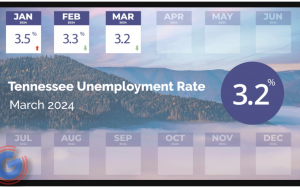About 63 percent of Tennessee ZIP Codes have high rates of student loan delinquency, according to a report from the Center for American Progress.
The organization mapped debt by ZIP Code and found many counties in the state have high debt rates, most in rural areas.
Report co-author Maggie Thompson, campaign manager for "Higher Ed, Not Debt," says this isn't a problem only for Millennials.
"This is not just an issue for young people or students; it's really an issue that's fundamentally affecting our economy," says Thompson. "Student loan debt is something that's limiting people's ability to buy homes. We have stories from several borrowers who are delaying marriage because of student loan debt."
Nationwide, student debt amounts to more than $1.3 trillion, and 43 million Americans owe debt related to their student loans. The report highlights relief programs, particularly for borrowers with federal loans, but Thompson and others say many in need are not aware of the help available.
Mor Aframian accrued $75,000 in student loans to get her undergraduate and master's degrees. Now at age 28, she says she has paid off just one-third of the balance, as she looks for work with her marketing and event-planning expertise.
"All of my offers told me I was either overqualified for the job, or they're not really looking for somebody with a master's degree," says Aframian. "So, it kind of felt like I went on and got this additional education - but now, nobody can afford to hire me."
Tennessee received recognition in the report for its Tennessee Promise program, which covers tuition costs not covered by federal aid for qualifying students to attend community college.
Thompson calls it an important step forward.
"For states like Tennessee, it's obvious that people are starting to see the need for more affordable higher ed, in general," Thompson says. "Pairing that with policies that can help borrowers, people that are already out of school and paying the debt, is one way that states can really have an impact."
The report recommends that at the state level, as with other kinds of debt, student-loan borrowers should be allowed to refinance their debt, which is currently difficult to do.
Source:
Partner Station WMSR












